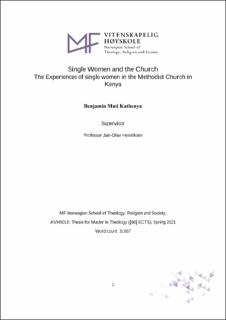| dc.description.abstract | In Africa, marriage is respected, and nobody should be left out without marrying or being married. This is one reason why singlehood has been perceived to be problematic and not acceptable, not only in society but also in the church. This study seeks to determine the experiences of single women both in the church and how the local community impacts these experiences. The research question addressed in the study is: What are the single women's experiences within the context of the Methodist Church and the local community in Kenya? This question is addressed by answering the following sub-questions. First, how are single women expressing their experiences and treatment in the church? Secondly, how does their local community impact single women experiences?
The study involved four different groups of single women, namely: single women who have never been married, those who are divorced, the widowed, and single women with children out of wedlock. Three theories were used to understand and interpret single women's experiences in the Church and the society: The stigma theory, social learning theory, and the patriarchy theory, where I applied patriarchal practices and social structures.
The study's findings revealed that single women are far more excluded and negatively impacted than their male counterparts. It was clear that cultural beliefs were the main factors leading to the marginalization of single women in the church. The informants expressed how they are negatively treated and perceived as immature and incomplete, hence exclusion from church leadership positions. The same cultural impact led to the exclusion of single women in church activities, name-calling, low self-esteem, among other challenges. In addition to the many challenges faced by single women, they also lacked pastoral care. They were stigmatized; even their children were stigmatized and shamed, for example, during baptism, when the pastor demands to know the child's father.
In society, the patriarchal practices and social structures formulated by men are demeaning, devaluing, and discriminative to single women in many ways. These patriarchal structures and systems elevate men and exclude women, for example, by denying single women property. This aspect of being devalued and side-lined creates low self-esteem, poverty, and a series of other challenges related to poverty, such as prostitution.
However, there was some good news in this study. Some single women have had the resilience and had overcome the challenges of singleness and embraced the positives of singleness. They pointed out the freedom to own their property and freedom to realize their future without any men's interference. | en_US |
